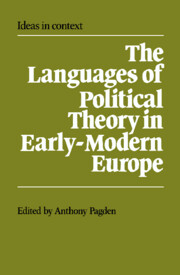Book contents
- Frontmatter
- Contents
- Notes on contributors
- Acknowledgements
- Introduction
- 1 The concept of a language and the métier d'historien: some considerations on practice
- PART I
- PART II
- PART III
- 10 Liberty, luxury and the pursuit of happiness
- 11 The language of sociability and commerce: Samuel Pufendorf and the theoretical foundations of the ‘Four-Stages Theory’
- 12 ‘Da metafisico a mercatante’: Antonio Genovesi and the development of a new language of commerce in eighteenth-century Naples
- PART IV
- Index
- Ideas in Context
12 - ‘Da metafisico a mercatante’: Antonio Genovesi and the development of a new language of commerce in eighteenth-century Naples
Published online by Cambridge University Press: 04 September 2009
- Frontmatter
- Contents
- Notes on contributors
- Acknowledgements
- Introduction
- 1 The concept of a language and the métier d'historien: some considerations on practice
- PART I
- PART II
- PART III
- 10 Liberty, luxury and the pursuit of happiness
- 11 The language of sociability and commerce: Samuel Pufendorf and the theoretical foundations of the ‘Four-Stages Theory’
- 12 ‘Da metafisico a mercatante’: Antonio Genovesi and the development of a new language of commerce in eighteenth-century Naples
- PART IV
- Index
- Ideas in Context
Summary
Genovesi's appointment in 1754 to the specially created chair di commercio e di meccanica at Naples university marked, as Franco Venturi has noted, the full flowering of the complex of political and cultural developments which made up the Neapolitan enlightenment. Yet this event is perhaps too easily seized upon as representing the birth of a secular science of politics, a transition, as Genovesi jokingly said of his new position, from metafisico to mercatante. In this essay I wish to show how these two elements were fused as Genovesi sought to give them coherent expression in a new language of politics adapted to the needs of modern commercial society.
Born in 1713 at Castiglione near Salerno, Genovesi was the first son of a family of small landowners fallen on hard times. He was educated for the priesthood, being ordained in 1737, when the death of his uncle gave him enough money to continue his studies in Naples. Neapolitan intellectual life was at this time undergoing a profound change. The Cartesian and Platonist philosophies which had dominated the last fifty years still prevailed, but their three main representatives, Pietro Giannone, Giambattista Vico and Paolo Mattia Doria, were all to die in the 1740s and an important new current of thought, fervently anti-metaphysical in character and stressing the experimental method of Newton, was growing up in opposition to them.
- Type
- Chapter
- Information
- The Languages of Political Theory in Early-Modern Europe , pp. 277 - 300Publisher: Cambridge University PressPrint publication year: 1987
- 11
- Cited by



